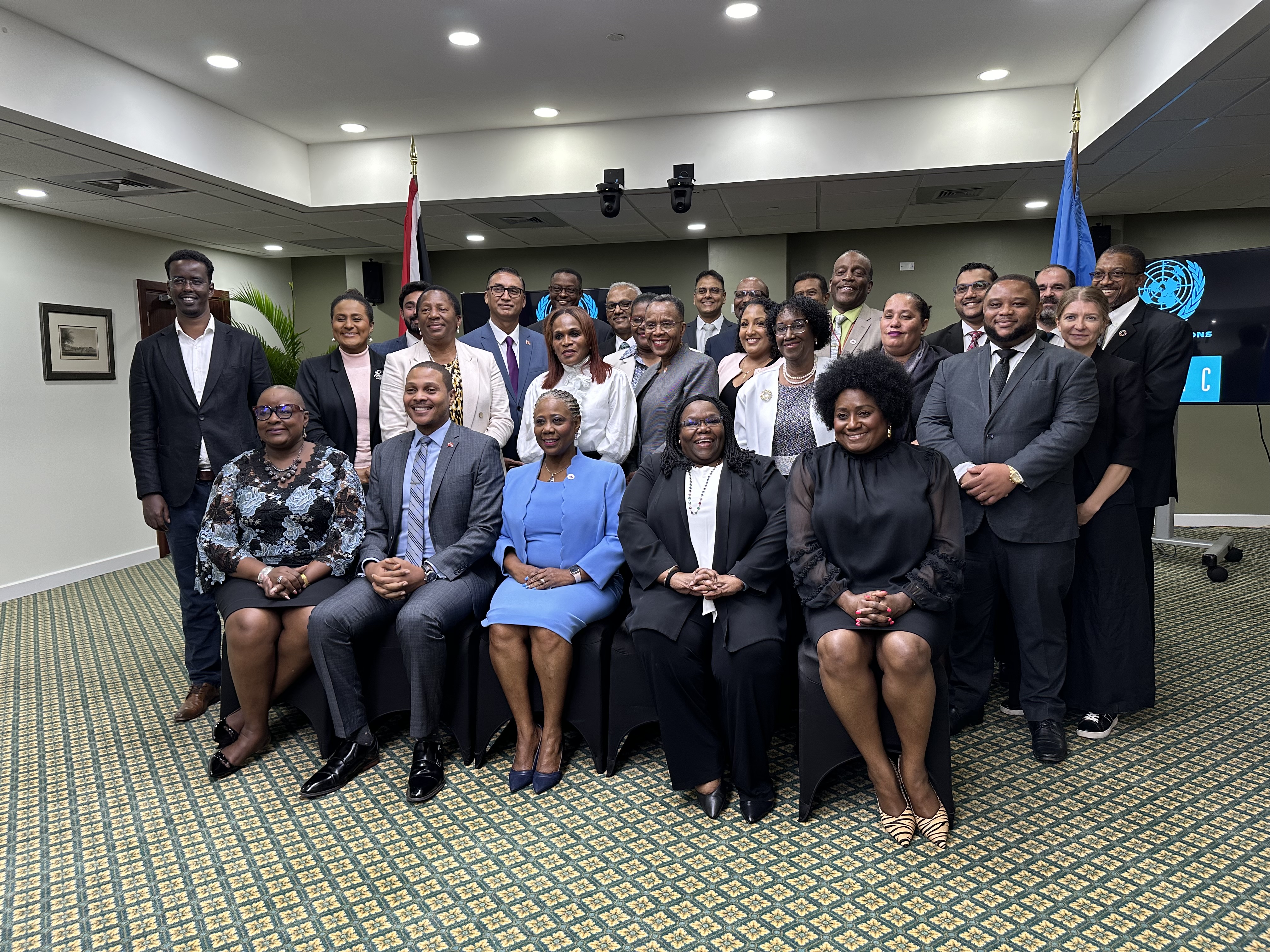T&T Parliamentarians Engage in Masterclass on Data, Statistics and AI for Decision Making and Sustainable Development
Área(s) de trabajo
Tema(s)
Trinidad and Tobago legislators are enhancing their understanding and knowledge of data, statistics and artificial intelligence (AI) for improved legislation and sustainable development. Parliamentarians including the Speaker of the House, President of the Senate, government ministers, opposition MPs and independent senators actively participated in a Masterclass on Data and Statistics for Decision Making, organized by the United Nations Economic Commission for Latin America and the Caribbean (ECLAC) in collaboration with the Parliament of The Republic of Trinidad and Tobago.

Director of ECLAC Caribbean, Diane Quarless, noted that the Parliament is the highest authority in the land and that full embrace of data goes hand in hand with sustainable development. “At ECLAC and within the wider UN, it is our hope that this substantive exchange will move us closer to decisive embrace of a National Statistical System (NSS) of Trinidad and Tobago that will serve as a model not only for the Caribbean, but one that can be emulated as a standard-bearer for all SIDS. This will not be possible without the action of the Members of Parliament… the power to create an enabling legislative environment for the NSS rests solely with you.”
The parliamentarians engaged with Professor of the Practice in Data Science at the University of Virginia, Renee Cummings, on the use of data and artificial intelligence to power sustainable development. She noted that top global companies have used smartphone-generated data to become some of the most profitable entities in the world, and that they have a wealth of data that influences everything from personal decision-making to geopolitics. “Data was anointed May 2017, the world’s most valuable resource. The Economist said that data is the catalyst for growth in the 21st century and everything human is now being turned into data… Once you have a smartphone, once you’ve been on the internet, if you’ve used Spotify, Netflix, internet shopping, it means that your data is now owned by someone else… Presidents are now calling the heads of our tech companies and asking them how do we regulate you, what do we need to do, how do we harness the power of data, AI, algorithms… what are legislation and regulation supposed to look like?”
In her welcome remarks, Speaker of the House of Representatives Bridgid Annisette-George addressed the heads of ECLAC and the UN in T&T. “Your agencies are no strangers to the Parliament of the Republic of Trinidad and Tobago. We rely on the publications and statistics that you publish in a lot of the work we do… The United Nations has provided a framework for planning and implementing the statistical capacity building activities needed to achieve the scope and intent of the 2030 Agenda for sustainable development… I see this exchange as one of the significant steps being taken in this country, to transform our system and to address any call which may exist for data and for responsible data practice for our future.”
Resident Coordinator Joanna Kazana outlined the UN’s role in supporting national institutions to accelerate implementation of the 2030 Sustainable Development Goals (SDGs). “In this context, the Parliament plays a critical role in creating a legal framework that empowers and reforms the Central Statistical Office. Your prioritizing of this issue and the draft law will be a great example of this Parliament’s leadership and Trinidad and Tobago’s active role in implementation of its regional and global commitments.”
The parliamentarians also engaged in discussion with Coordinator of the Statistics and Social Development Unit at ECLAC Caribbean, Abdullahi Abdulkadri, on the role of the legislature in the establishment and functioning of an NSS. The Masterclass was organized to raise the awareness of legislators on the NSS and to underscore the important role of The Parliament in creating a supportive legislative environment for official statistics. To this end, the UN Country team is supporting the government’s efforts to strengthen infrastructure, expertise, and organizational skills through a modernized statistical ecosystem.
The Masterclass is part of a series of initiatives under a two-year project on “Modernising Trinidad and Tobago’s Statistical Ecosystem through Enhanced SDG Data Development” financed by the UN's Joint SDG Fund and which is being jointly implemented by the Pan American Health Organization, the International Labour Organization, the United Nations Environment Programme, and ECLAC, with the support of the UN Resident Coordinator’s Office for Trinidad and Tobago. The project seeks to modernize the data ecosystem in Trinidad and Tobago to fortify the country's ability to generate and analyze high quality, disaggregate data that can support the achievement of the 17 Sustainable Development Goals and ensure that the needs of vulnerable groups, including women, children and people of disabilities, are clearly captured in official data and statistics. With the knowledge gained, parliamentarians will be able to strengthen legislative best practices on data and statistics in Trinidad and Tobago.
Tipo
País(es)
-
Trinidad and Tobago